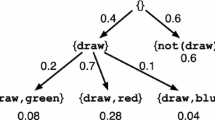
Overview
- This unique, example-driven monograph integrates coverage of random/probabilistic algorithms, assertion-based program reasoning, and refinement programming models, providing a focused survey on probabilistic program semantics
- Includes supplementary material: sn.pub/extras
Part of the book series: Monographs in Computer Science (MCS)
Access this book
Tax calculation will be finalised at checkout
Other ways to access
About this book
Probabilistic techniques are increasingly being employed in computer programs and systems because they can increase efficiency in sequential algorithms, enable otherwise nonfunctional distribution applications, and allow quantification of risk and safety in general. This makes operational models of how they work, and logics for reasoning about them, extremely important.
Abstraction, Refinement and Proof for Probabilistic Systems presents a rigorous approach to modeling and reasoning about computer systems that incorporate probability. Its foundations lie in traditional Boolean sequential-program logic—but its extension to numeric rather than merely true-or-false judgments takes it much further, into areas such as randomized algorithms, fault tolerance, and, in distributed systems, almost-certain symmetry breaking. The presentation begins with the familiar "assertional" style of program development and continues with increasing specialization: Part I treats probabilistic program logic, including many examples and case studies; Part II sets out the detailed semantics; and Part III applies the approach to advanced material on temporal calculi and two-player games.
Topics and features:
* Presents a general semantics for both probability and demonic nondeterminism, including abstraction and data refinement
* Introduces readers to the latest mathematical research in rigorous formalization of randomized (probabilistic) algorithms * Illustrates by example the steps necessary for building a conceptual model of probabilistic programming "paradigm"
* Considers results of a large and integrated research exercise (10 years and continuing) in the leading-edge area of "quantitative" program logics
* Includes helpful chapter-ending summaries, a comprehensive index, and an appendix that explores alternative approaches
This accessible, focused monograph,written by international authorities on probabilistic programming, develops an essential foundation topic for modern programming and systems development. Researchers, computer scientists, and advanced undergraduates and graduates studying programming or probabilistic systems will find the work an authoritative and essential resource text.
Similar content being viewed by others
Keywords
Table of contents (11 chapters)
-
Front Matter
-
Probabilistic guarded commands and their refinement logic
-
Advanced topics: Quantitative modal logic and game interpretations
-
Back Matter
Authors and Affiliations
Bibliographic Information
Book Title: Abstraction, Refinement and Proof for Probabilistic Systems
Authors: Annabelle McIver, Carroll Morgan
Series Title: Monographs in Computer Science
DOI: https://doi.org/10.1007/b138392
Publisher: Springer New York, NY
eBook Packages: Computer Science, Computer Science (R0)
Copyright Information: Springer-Verlag New York 2005
Hardcover ISBN: 978-0-387-40115-7Published: 19 November 2004
Softcover ISBN: 978-1-4419-2312-7Published: 19 November 2010
eBook ISBN: 978-0-387-27006-7Published: 27 October 2005
Series ISSN: 0172-603X
Series E-ISSN: 2512-5486
Edition Number: 1
Number of Pages: XX, 388
Number of Illustrations: 63 b/w illustrations
Topics: Software Engineering/Programming and Operating Systems, Probability Theory and Stochastic Processes, Programming Techniques, Logics and Meanings of Programs, Programming Languages, Compilers, Interpreters, Mathematical Logic and Formal Languages




